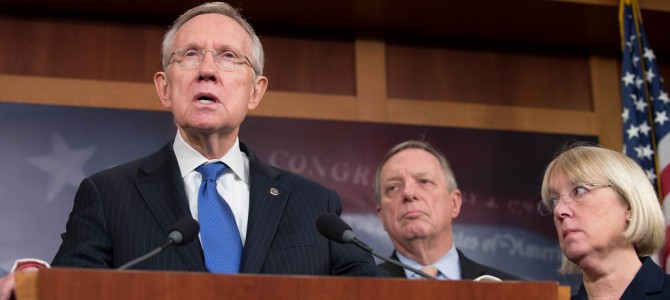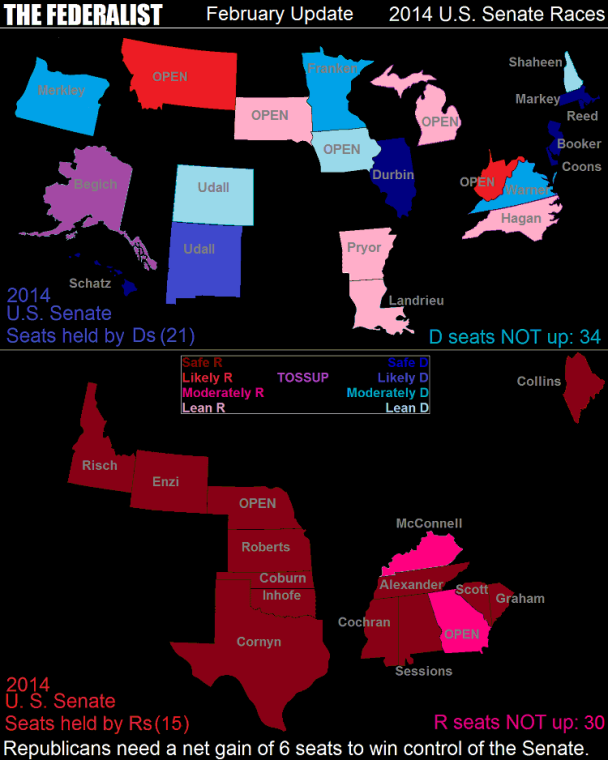
When I first took a look at the picture for the U.S. Senate, I saw fourteen exciting-to-mildly interesting Democrat-held seats and three Republican-held ones. Since December, it has been clear Senator Collins has no intention of retiring, so with that possibility axed, the number of seats on the GOP worth watching drops to two. Senator Tom Coburn announced his retirement, and the special election to fill his seat will be held concurrently with the scheduled midterm election. His seat is quite safe, so the primary will be where all of the action lies.
Bigger than the retirement or our removal of Collins from my watch list has been the developments in the Democrat-held states. With polling releases and a closer examination of the Gallup surveys (along with available exit poll data from ’08, ’10, and ’12), I am moving several vulnerable Democrats to the endangered list: Mary Landrieu of Louisiana and Kay Hagan of North Carolina are now projected to lose their seats by a close margin. In addition, Republican Terri Lynn Land, for now, appears to have the edge in Michigan, with fund-raising figures and polling strongly suggesting this race to be the best for Republicans in the Midwest. Despite a lack of polling, further review of the election data in 2008 along with fund-raising figures have convinced me to push Mark Begich onto the very vulnerable list: Alaska is now a toss-up. Right now, the Republicans are projected a net gain of seven seats, enough for a 52-48 majority in the Senate if Begich manages to hold on.
In addition, several other races have the potential to become interesting: a review of the polling data released from December onward, along with previous election cycle datasets, has compelled me to move New Hampshire and Colorado from moderate-Democrat to lean-Democrat. Former Senator Scott Brown will likely enter in the former, and has seen close polling in two out of the last three releases (PPP, Purple Strategies, and UNH), while Senator Udall’s weakened rating is the result of a closer examination of the polling data and previous cycles where partisan turnout was evenly matched, as what appears to be shaping up.
Lastly, we have two minor ratings changes.
With the entrance of Ed Gillespie in Virginia, we now have a race in the Old Dominion, though Mark Warner is still the obvious favorite. Polling released after Gillespie’s initial announcement finds him trailing in the double-digits, but also finds the Senator around the 50-51% mark, before any ads or efforts have begun by the GOP. Barring a wave or major misstep, Warner will win re-election, but I project it will be within the high single-digits, instead of the currently perceived romp.
Mark Udall’s cousin Tom in New Mexico rounds out the changes in these projections. Gillespie won’t be the only fomer party chair attempting to oust an incumbent Democrat: former New Mexico Republican Party chairman Allen Weh has now thrown his hat in the ring. Weh doesn’t have much of a real chance at unseating Udall, unless a wave (or massive goof-up) materializes. Still, his entrance in the race is enough to move the race from safe to likely Democrat- the difference between no chance in hell, and a slight chance in a national rout.
Republicans have every right to feel giddy about their odds in November, what with putting over half of the Democrat-held seats up in play or outright favored in them, but they must remain focused. Their odds of winning are tied directly into their ability to avoid wedge issues within their party and perceived “wackiness” among their crop of candidates. These two pitfalls cannot be understated: the GOP must avoid both, or it will face a catastrophic collapse in fortunes.
First, the wedge danger: Congressional Republicans have made it quite clear they intend to at least restart the conversation on immigration, which already has many conservatives groaning loader than a bathroom attendee in a Taco Bell. In an election cycle, where you need every bit of your base to turn out to maximize your gains, this is, frankly, puzzling. If the conversation fizzles out, many on the right will cautiously re-focus on the fight against Obamacare. If it drags on through the spring and summer, and bears legislative fruit, we could see a schism forming just months before Election Day, and one very unlikely to heal itself in time to deliver a potentially historic win.
One race in particular to watch for conservative push back would be Senate Minority Leader Mitch McConnell’s fight for re-election in Kentucky. Despite his poor approval rating, a review of exit poll data and the Gallup state surveys has moved the seat from lean to moderate-Republican: the state’s voters have become more Republican over the last half-decade, and there is no sign of that trend slowing down. That is comforting for the Senator, provided he makes it out of the primary. His opponent, Matt Bevin, has seen his funds and poll standing rise in the last few months. If enough conservatives decide to “make an example” out of a perceived establishment candidate over the aforementioned wedge issue, McConnell would (obviously) be their biggest target.
The wackiness factor: While some candidates are indeed fringe, there will be an effort by very vulnerable Democrats to paint any statement by any Republican candidates as evidence of looniness. The best way to avoid this is to keep in mind the current state of culture: Vines and memes. Any candidate should keep their answers brief and direct, with a means to pivot back to the issue that is giving Republicans their edge: Obamacare. It is better to be thought a bit vague and mocked for not saying much than opening one’s mouth and inadvertently launching a thousand daggers. The heat you take for not speaking is a flint strike compared to the supernova that will be made out of a poor choice of words.
What are some races to watch in the month ahead? Oregon could become interesting, particularly the possible contrast of a pediatric neurosurgeon (Dr. Monica Wehby) running against Senator Jeff Merkley. The state’s exchange is a complete disaster, and Dr. Wehby, focused almost entirely on the health care law, raised an impressive $500k in the last quarter. Since we have no polling data for this match up, we’re going to leave this race as moderate-Democrat. Lastly, Georgia is still a Republican-favored race worth watching. We haven’t had any non-partisan sponsored polling in a while, but the Democrat, Michelle Nunn, has been fund-raising well and picked up endorsements from several former Republican Senators. The state’s electorate makes getting to the mid-40s easy, but winning is another matter. Still, the Republican field is wide open, and if it turns bitter, a damaged candidate could give her a further boost.
This election cycle has seen the fortunes of Republicans rapidly improve, but we are still nine months away from Election Day, and a billion potential gaffes, inter-party fights, and campaign blunders await the candidates. If Republicans can wise up and stay focused, they are facing big gains.
 Here’s a run down on the recent race changes:
Here’s a run down on the recent race changes:
Kentucky: Lean Republican to Moderately Republican. Surveys and exits have revealed a continuing trend rightward, giving the Democrat a growing hill to climb, even against a weakened incumbent.
Alaska: Lean Democrat to Toss Up. Polling has been scant, but Republicans are in a fund-raising frenzy, and Senator Begich’s extremely thin 2008 victory came in part due to Republicans dismayed with Stevens, a split unlikely to repeat this November.
Louisiana: Lean Democrat to Lean Republican. A recent poll puts Cassidy ahead, and a review of the exit poll and state surveys show a rightward shift since Landrieu’s last (and close) election in 2008.
Michigan:Toss Up to Lean Republican. Republican Land continues to be a fund-raising juggernaut, easily besting her Democratic opponent, and polls are giving her a slight edge.
Colorado: Moderately Democrat to Lean Democrat. After reviewing previous election data and re-examining the polls, we are changing the initial projection to reflect what now looks to be a very close race, though still favoring the Senator in the end.
New Mexico: Safe Democat to Likely Democrat. With Weh in, there’s a potential for the Republicans to gain in the event of a massive win, though Tom Udall is far less endangered than his cousin to his North.
Virginia: Likely Democrat to Moderately Democrat. Gillespie is in (as insinuated in the last edition) and trails Warner in initial polling, but raised $300,000 in his first week. He’ll try to make it a race.
New Hampshire: Moderately Democrat to Lean Democrat. Scott Brown is almost certainly running, and is polling a small deficit behind incumbent Senator Jeanne Shaheen.
North Carolina: Toss Up to Lean Republican. Senator Hagan trails every polled Republican and is facing an electorate much less Democratic than what she enjoyed in 2008.
Brandon Finnigan has been covering polls and elections at the blog Ace of Spades HQ and on Twitter at @conartcritic since 2010. Between races, he shares his love of art, astronomy, and craft beer with his wife in Southern California.









